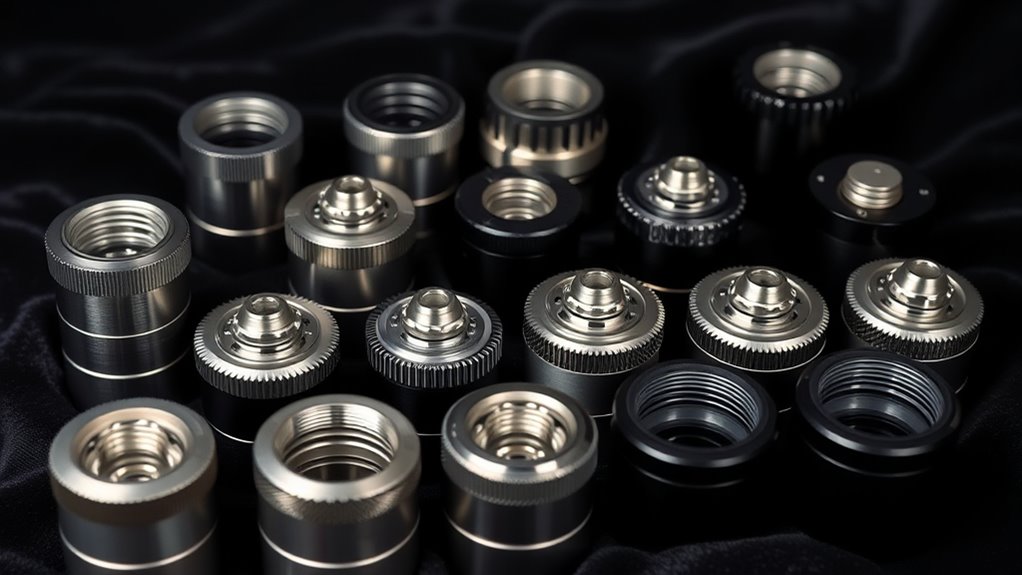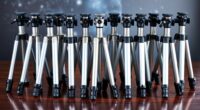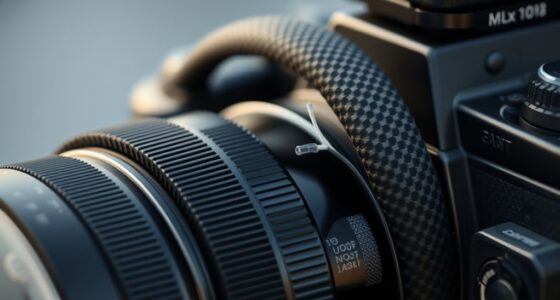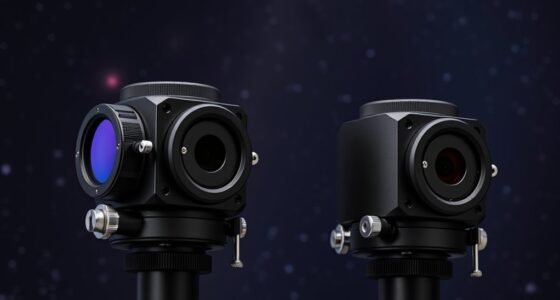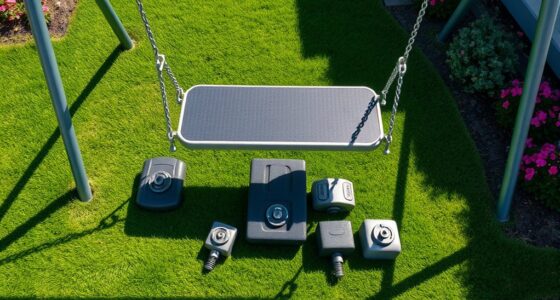If you’re looking for the best 1.25-inch telescope focusers of 2025, I’ve tested many to find the top options for sharp, precise viewing. I recommend focusers with high-precision mechanisms like double helical and rack and pinion types, which offer smooth adjustments and stability. Materials like aluminum and brass guarantee durability, while compatibility with your telescope is essential. Keep reading to discover the most reliable focusers that will enhance your observing experience.
Key Takeaways
- High-precision double helical and rack-and-pinion focusers enable fine, backlash-free adjustments for sharp, detailed views.
- Compatibility with 1.25-inch accessories, threading standards, and telescope types ensures versatile and seamless integration.
- Durable materials like aluminum, brass, and steel provide longevity and stability during extended use.
- Features such as internal threading, locking screws, and long focus strokes enhance fine-tuning and ease of use.
- Lightweight, portable designs support quick setup and are suitable for amateur astronomers and astrophotography enthusiasts.
Astromania Double Helical Focuser for Telescopes
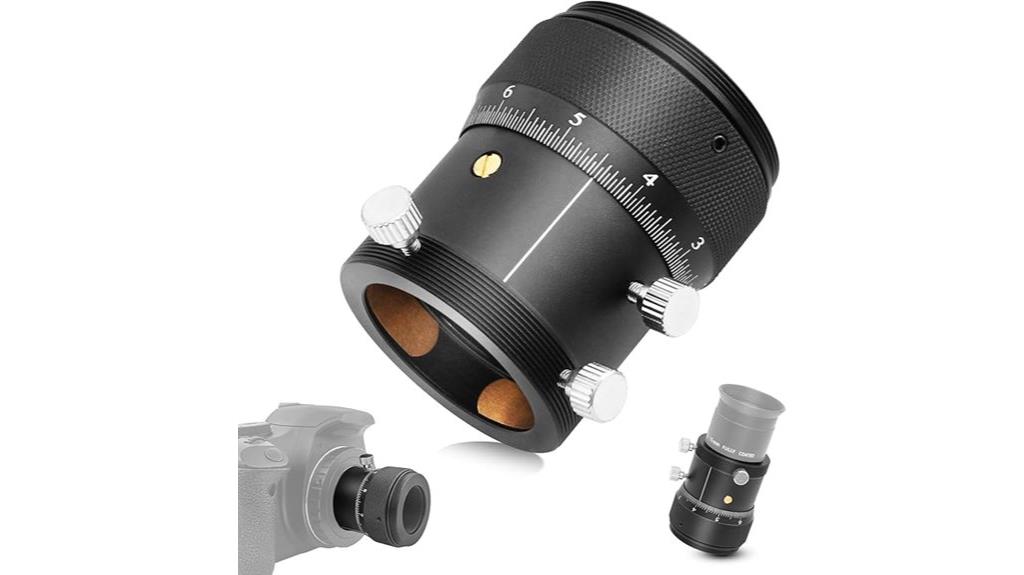
The Astromania Double Helical Focuser is an excellent choice for amateur astronomers who need precise, smooth focusing with their 1.25-inch accessories. It offers a remarkable 0.05mm accuracy and a 10mm focusing stroke, making fine adjustments effortless. Its full metal construction guarantees durability, and the fixed orientation keeps your camera or eyepiece steady during focusing. The versatile M42x0.75 thread and included adapter allow easy connection to various accessories. While it performs well for detailed observations, some users note that heavy gear can stress its internal components. Overall, it’s a reliable, precise focuser for those seeking high-quality, smooth focusing in a compact design.
Best For: amateur astronomers seeking precise, smooth focusing for 1.25-inch accessories like finders and guidescopes.
Pros:
- High precision with 0.05mm accuracy and smooth focusing motion
- Full metal construction for durability and stability
- Fixed orientation prevents rotation of cameras or eyepieces during focusing
Cons:
- Internal components, such as sliding rods, may be fragile and prone to snapping under heavy load
- Limited focusing distance when using heavier accessories like diagonals or binoviewers
- Reports of packaging issues and potential longevity concerns over time
60mm Guide Scope for Telescope with 1.25 Micro Focuser Black
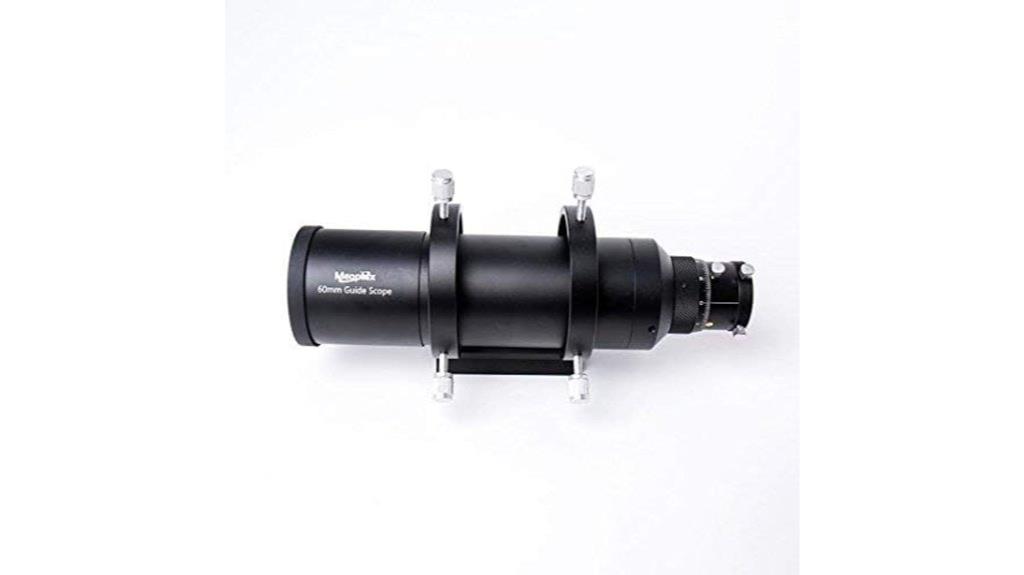
If you’re seeking a reliable guide scope that combines precise focusing with ease of use, the 60mm Guide Scope with a 1.25-inch micro focuser is an excellent choice. Its bright, wide-field optics help you easily identify guide stars, perfect for astrophotography setups up to 1500mm focal length. The double helical focuser offers a 48mm range, including a 10mm micro-focusing adjustment, ensuring pinpoint focus. It’s quick to mount on most telescopes, thanks to its adjustable dovetail and easy setup. Compact and lightweight at just 2.46 pounds, it’s a versatile tool that enhances your imaging precision effortlessly.
Best For: amateur astrophotographers seeking a compact, precise guide scope compatible with telescopes up to 1500mm focal length for improved imaging accuracy.
Pros:
- Bright, wide-field optics for easy guide star identification
- Precise 1.25-inch double helical focuser with 48mm focusing range, including micro-focus adjustment
- Compact and lightweight design for straightforward mounting and portability
Cons:
- Limited to telescopes with focal lengths up to 1500mm, may not suit longer focal length setups
- Micro-focusing range of only 10mm may require careful adjustment for very fine focus
- Small size could be restrictive for users needing additional accessories or larger guide cameras
1.25 Inch Telescope Focuser for 4.5-8 Inch Newton Reflecting Telescopes
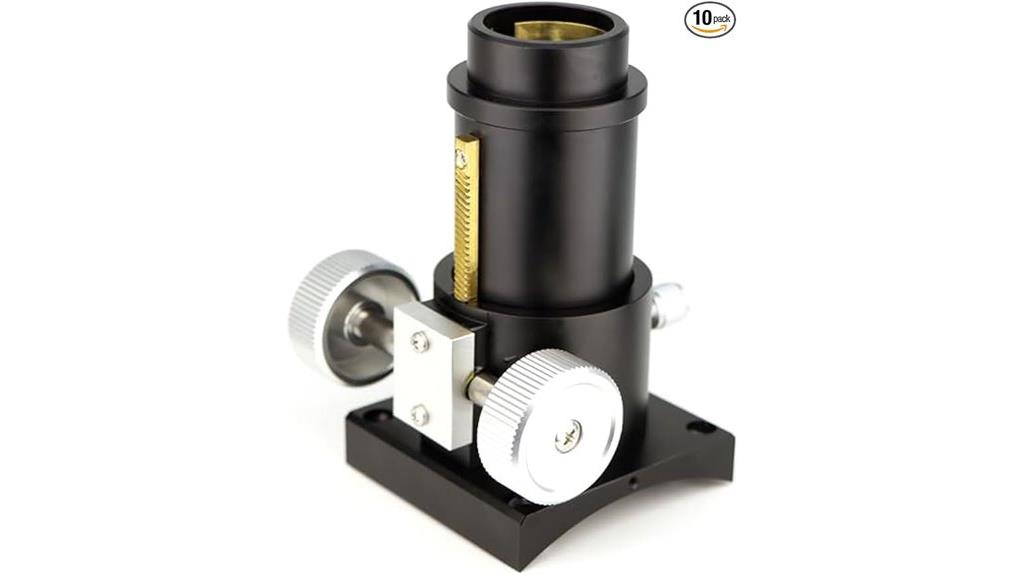
Looking for a robust focuser that fits 4.5 to 8-inch Newtonian reflectors? The SKYOPTIKST 1.25-inch metal focuser is designed for this range, offering durability and smooth operation. It’s compatible with threaded M78x1mm mounts, making installation straightforward, though some scopes like Skywatcher 150p may need modifications. Constructed entirely of metal, it minimizes reflections and enhances image clarity. Users have reported fitment challenges, often requiring adjustments or reinforcement, but overall, it delivers solid performance. With a weight of just 12.8 ounces, it’s a reliable upgrade for those seeking precision focus in their Newtonian telescopes.
Best For: amateur astronomers and telescope enthusiasts seeking a durable, smooth-operating focuser for 4.5 to 8-inch Newtonian reflectors.
Pros:
- Constructed entirely of metal for enhanced durability and stability
- Minimizes reflections with fully threaded interior, improving image quality
- Lightweight at 12.8 ounces, making it easy to handle and install
Cons:
- Fitment issues with some telescope tubes, requiring modifications such as enlarging holes or custom adapters
- Potential movement or rocking due to small set screws holding the main assembly, possibly needing reinforcement
- Reports of design or manufacturing flaws, such as the top piece falling off unexpectedly
SVBONY SV181 Rack and Pinion Focuser for Newtonian Telescopes
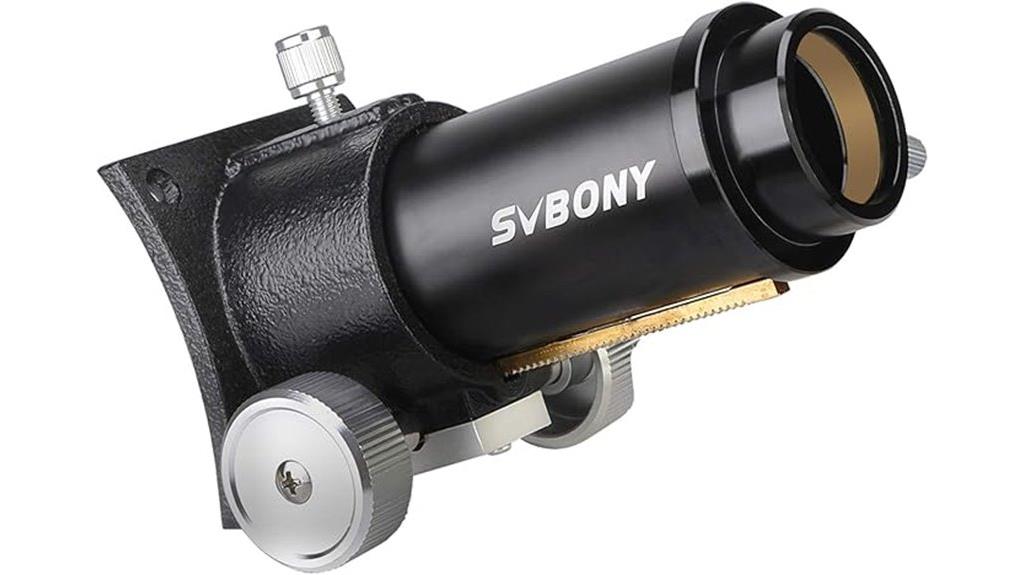
For amateur astronomers seeking precise and reliable focusing, the SVBONY SV181 Rack and Pinion Focuser stands out as an excellent upgrade for Newtonian telescopes. It’s designed for 1.25-inch eyepieces, offering smooth, backlash-free operation with durable all-metal construction, including brass gears and an aluminum draw tube. The focuser provides 65mm of travel and can handle high magnification, making it suitable for planetary observation and astrophotography. While some users may need to modify their scope for perfect fit—like enlarging mounting holes or trimming the draw tube—its stability and fine control make it a popular choice.
Best For: amateur astronomers and astrophotographers seeking precise, durable, and adjustable focusing for Newtonian telescopes with 1.25-inch eyepieces.
Pros:
- All-metal construction with brass gears ensures durability and smooth operation
- Precise rack and pinion gears provide backlash-free focusing and fine adjustments
- Lightweight and compact design makes it portable and easy to upgrade existing telescopes
Cons:
- May require modifications like enlarging mounting holes or trimming the draw tube for optimal fit on certain scopes
- Some users report wobbling or looseness, necessitating tightening or reinforcement
- The draw tube length could cause obstruction in fast Newtonian scopes without adjustments
Astromania Double Helical Focuser for Telescopes
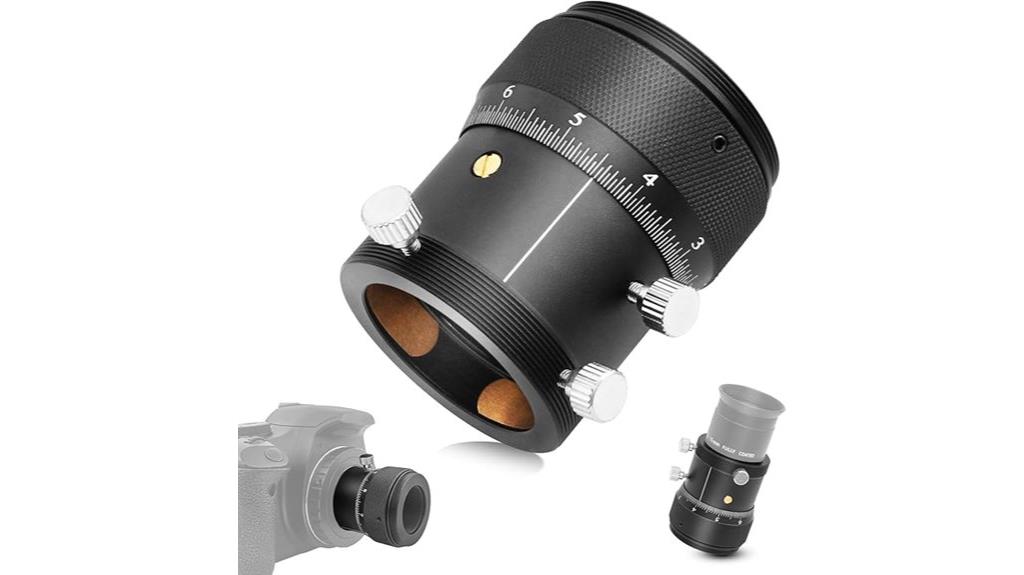
The Astromania Double Helical Focuser stands out for its high-precision 0.05mm focusing accuracy, making it ideal for astronomers who demand fine adjustments during imaging or detailed observations. Its smooth, firm motion allows precise control within a 10mm focusing stroke, suitable for finderscopes and guidescopes with a 1.25-inch interface. Constructed from full metal, it features versatile threaded connections, including M42x0.75 and M31x0.5, plus an adapter for added flexibility. The fixed orientation prevents rotation of attached accessories, maintaining consistent framing. While lightweight at just 3.2 ounces, users should handle it carefully, especially when using heavier accessories.
Best For: amateur astronomers and astrophotographers seeking precise, fine adjustments for finderscopes and guidescopes with a 1.25-inch interface.
Pros:
- High-precision focusing with 0.05mm accuracy for detailed astrophotography and observations
- Smooth, firm motion allows for fine adjustments within a 10mm focusing stroke
- Versatile threaded connections including M42x0.75 and M31x0.5, plus an adapter for flexible setup
Cons:
- Internal components like sliding rods may be fragile and prone to snapping under heavy loads or extended use
- Limited focusing distance when using heavier accessories such as diagonals or binoviewers
- Reports of packaging issues and potential durability concerns over time, especially with fragile parts
SVBONY Telescope Focuser Adapter 1.25 Inches
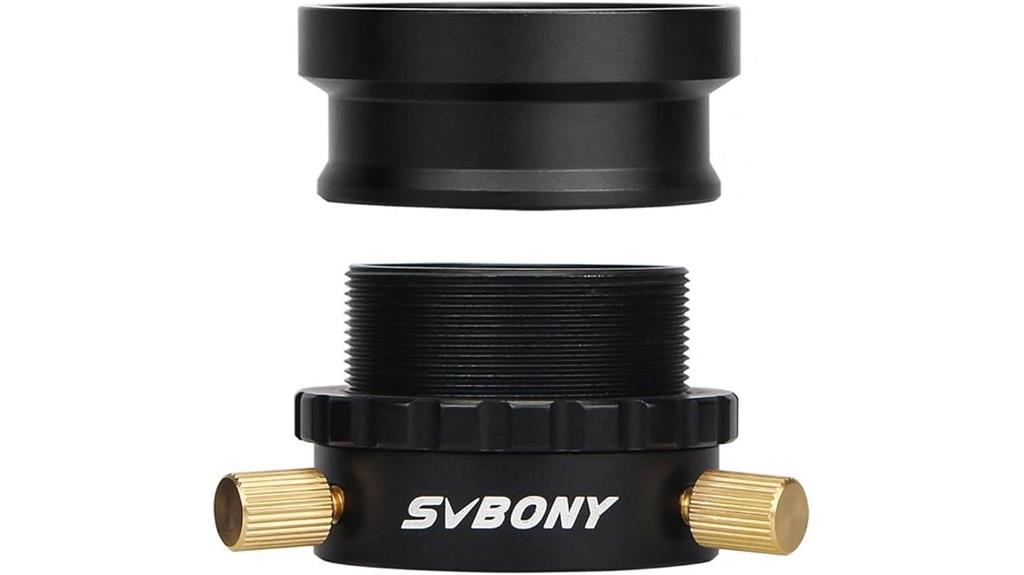
The SVBONY Telescope Focuser Adapter 1.25 Inches stands out as an excellent choice for amateur astronomers and scope builders seeking durable, adjustable, and easy-to-use accessories. Made of anodized aluminum, it offers robust construction with three locking thumbscrews for secure attachment. Its fine-threaded knurled ring allows precise micro-focusing, while the brass three-point ring ensures smooth focus adjustments. Compatible with M42x0.75 threaded accessories, it fits 1.25-inch eyepieces and cameras, making it versatile for various setups. Its low-profile design positions eyepieces close to the diagonal, simplifying viewing. Overall, it’s a reliable, affordable upgrade for enhancing telescope functionality.
Best For: amateur astronomers, scope builders, and astrophotographers seeking a durable, adjustable, and easy-to-use 1.25-inch focuser adapter for enhancing their telescope setups.
Pros:
- Made of durable anodized aluminum with a robust construction.
- Features three locking thumbscrews and a fine-threaded knurled ring for precise and secure adjustments.
- Compatible with M42x0.75 threaded accessories, suitable for eyepieces and cameras.
Cons:
- Thread threads may require lubrication or tape for smoother operation.
- Some users have noted that thread precision could be improved.
- Slightly limited to accessories with M42x0.75 threading, requiring additional adapters for other types.
Astromania AccuFocus Electronic Telescope Focuser
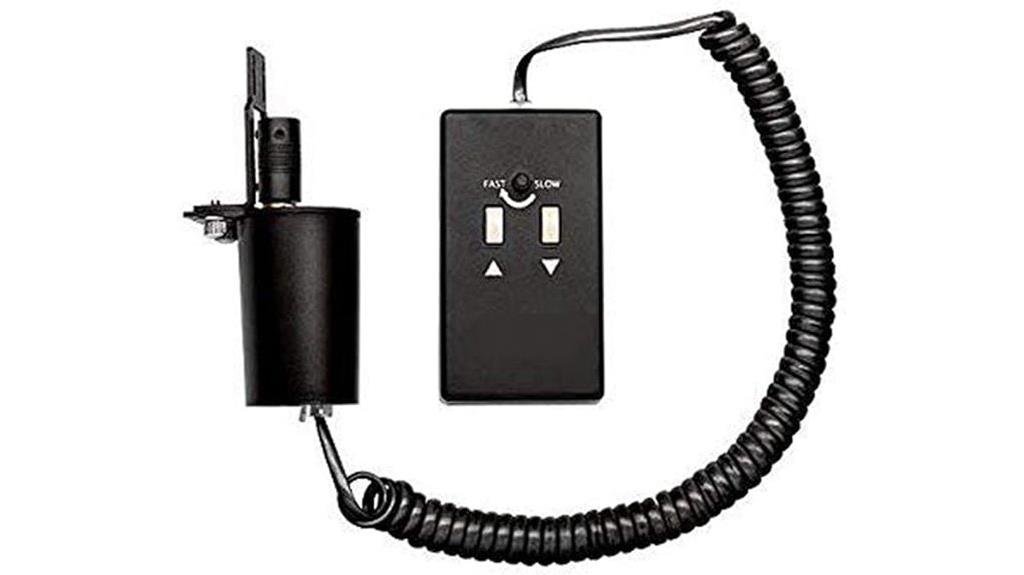
If you’re looking for an affordable, easy-to-install electronic focuser that improves high-magnification viewing and astrophotography, the Astromania AccuFocus is a solid choice. It features a durable motorized DC system compatible with many Celestron, Skywatcher, Meade, and Orion scopes, especially single-speed refractors and reflectors in the 60-127mm range. Installation is quick, often under 10 minutes, and the pushbutton controller offers smooth, vibration-free focus adjustments at multiple speeds. While it’s not suitable for APO two-speed focusers, many users find it greatly reduces image shake and enhances focusing precision, making it ideal for astrophotography and detailed observations.
Best For: amateur astronomers and astrophotographers seeking an affordable, easy-to-install electronic focuser for small to medium-sized telescopes to enhance high-magnification viewing and imaging.
Pros:
- Quick and easy installation, often within 10 minutes
- Smooth, vibration-free focus adjustments at multiple speeds
- Compatible with many popular telescope brands and models in the 60-127mm range
Cons:
- High battery consumption leading to frequent replacements
- Cheap plastic components and control box may fail after limited use
- Not suitable for APO two-speed focusers and may require modifications for durability
Alstar 1.25 High Precision Double Helical Focuser for Telescopes
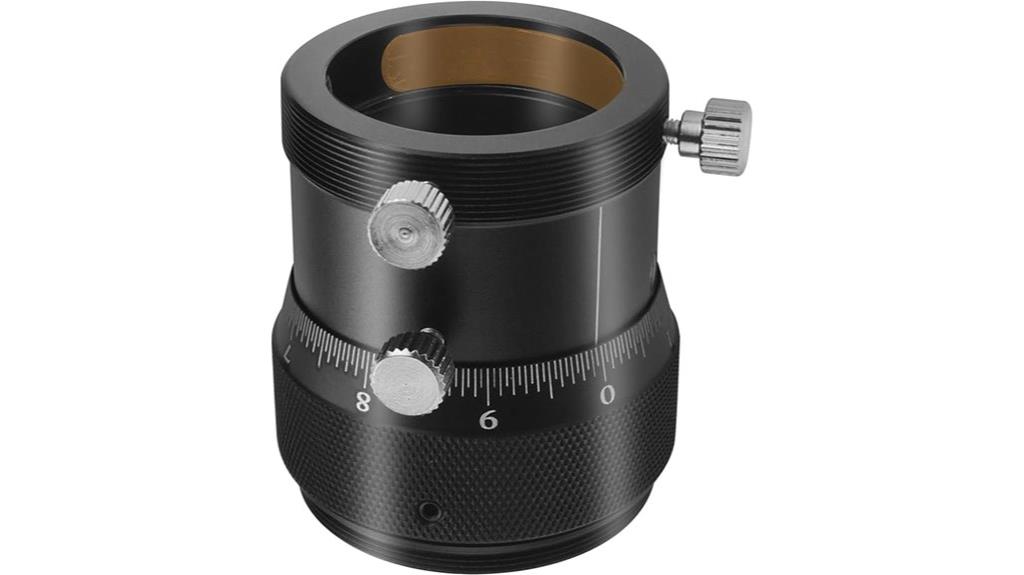
Designed for astronomers and astrophotographers seeking pinpoint focusing accuracy, the Alstar 1.25 High Precision Double Helical Focuser stands out with its impressive 0.1 mm adjustment precision. Its 10 mm focusing stroke allows for fine-tuned control, critical for astrophotography and detailed observations. Made from durable full metal, it’s built to last, with dimensions that fit standard 1.25-inch accessories and threads for easy compatibility with guider scopes, finder scopes, and guidescopes. Installation is straightforward, especially when upgrading existing R/P focusers with M42x0.75 threads. This focuser truly enhances focusing precision, making it an excellent choice for serious stargazers.
Best For: amateur and professional astronomers and astrophographers seeking precise, reliable focusing control for their telescopes and guidescopes.
Pros:
- Achieves high-precision focusing with 0.1 mm accuracy, ideal for astrophotography.
- Made from durable full metal construction for longevity and stability.
- Easy to install and compatible with standard 1.25-inch accessories and M42x0.75 threads.
Cons:
- Slightly limited focusing stroke of only 10 mm, which may not suit all focusing needs.
- May require additional adapters for certain telescope models or focusers.
- Dimensions and weight may be less suitable for ultra-compact or lightweight setups.
1.25 Helical Focuser, Aluminium Alloy 10mm Focusing Stroke
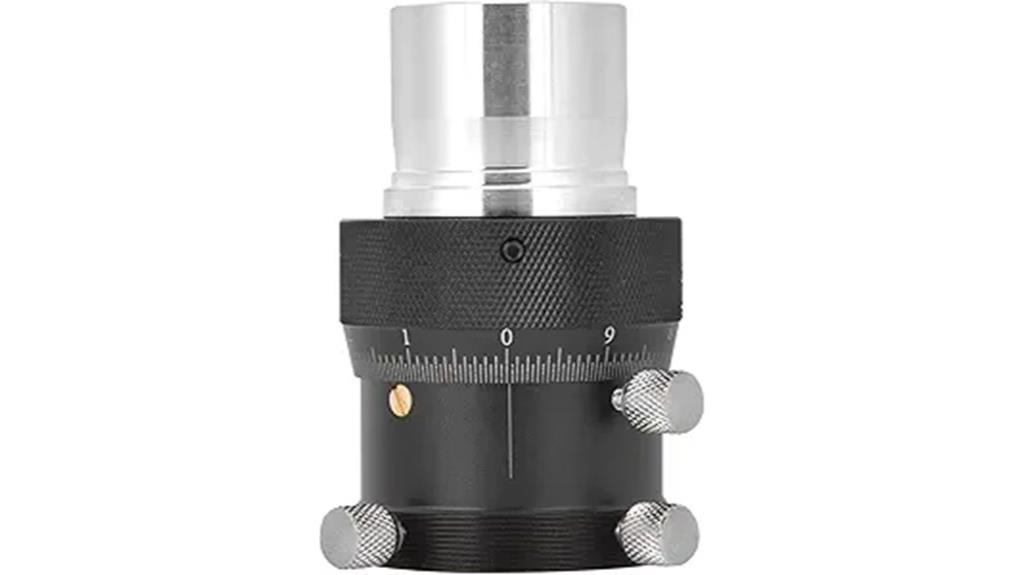
For amateur and professional astronomers seeking precise fine-tuning, the 1.25 Helical Focuser with a 10mm focusing stroke offers exceptional control. Made from durable aluminium alloy, it combines lightweight portability with sturdy construction, weighing around 119 grams. Its 10mm focusing stroke and 0.05mm adjustment accuracy enable smooth, precise focusing adjustments. The helical design allows for fine-tuning with minimal effort, making it ideal for guide scopes and detailed observations. Its compact size ensures easy transport and quick setup. Overall, this focuser provides reliable performance and excellent handling, perfect for those demanding accurate, repeatable focusing in various observing environments.
Best For: amateur and professional astronomers requiring precise fine-tuning for guiding and detailed observations with a lightweight, portable focuser.
Pros:
- High-precision adjustment with 0.05mm accuracy for accurate focusing
- Durable aluminium alloy construction for strength and longevity
- Compact and lightweight design for easy transport and quick setup
Cons:
- Limited focusing stroke of approximately 10mm may not suit all focusing needs
- Thread size of M28.5*0.6 could require adapters for some telescopes
- Only available in one size and configuration, limiting versatility for different setups
80MM Refractor Focusing Seat with Rack Pinion and 1.25 Inch Eyepiece Interface
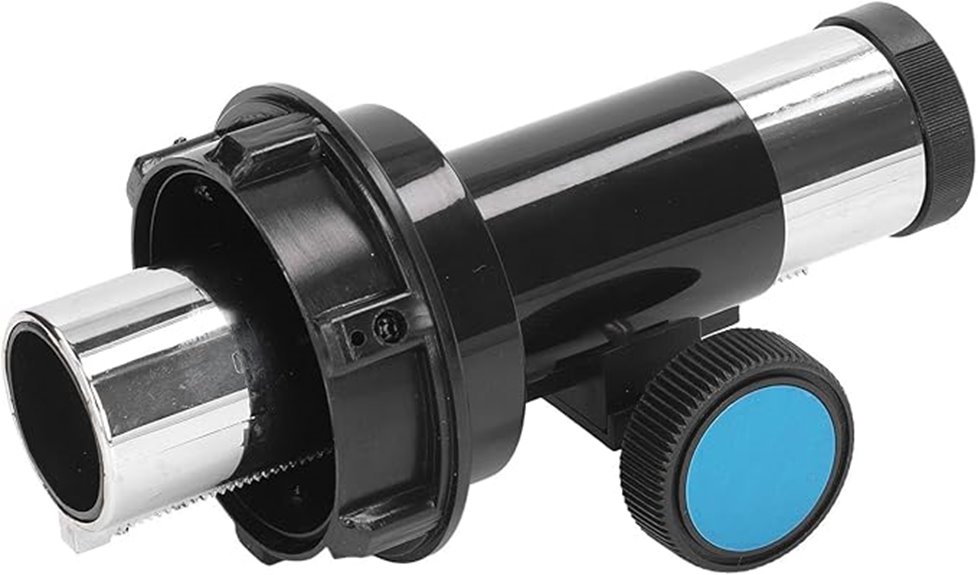
The MM Refractor Focusing Seat with Rack Pinion and 1.25 Inch Eyepiece Interface stands out as an excellent choice for amateur astronomers and DIY enthusiasts seeking precise, stable focusing capabilities. Its rack and pinion system allows fine adjustments, ensuring clear, sharp images at high magnification. Made from lightweight ABS, it offers durability without adding weight. The 1.25-inch eyepiece interface supports various eyepieces, increasing versatility. A side locking screw keeps the eyepiece secure, preventing slips during observation. Internally threaded to reduce reflections, it delivers brighter, clearer images. Easy to install and operate, it’s a reliable accessory for enhancing your telescope’s performance.
Best For: amateur astronomers, DIY telescope enthusiasts, and anyone seeking precise, stable focusing for 80mm refractor telescopes.
Pros:
- Allows fine, precise adjustments for clear, high-magnification images
- Made of lightweight, durable ABS material for easy handling and stability
- Supports 1.25-inch eyepieces, offering versatile compatibility with various eyepieces
Cons:
- Installation may require some DIY skills for optimal setup
- Limited to 80mm aperture telescopes, not suitable for larger scopes
- Slightly bulkier compared to simpler focusing accessories
Astronomical Telescope Helical Focuser, Aluminium Alloy 1.25-inch Inner T Interface
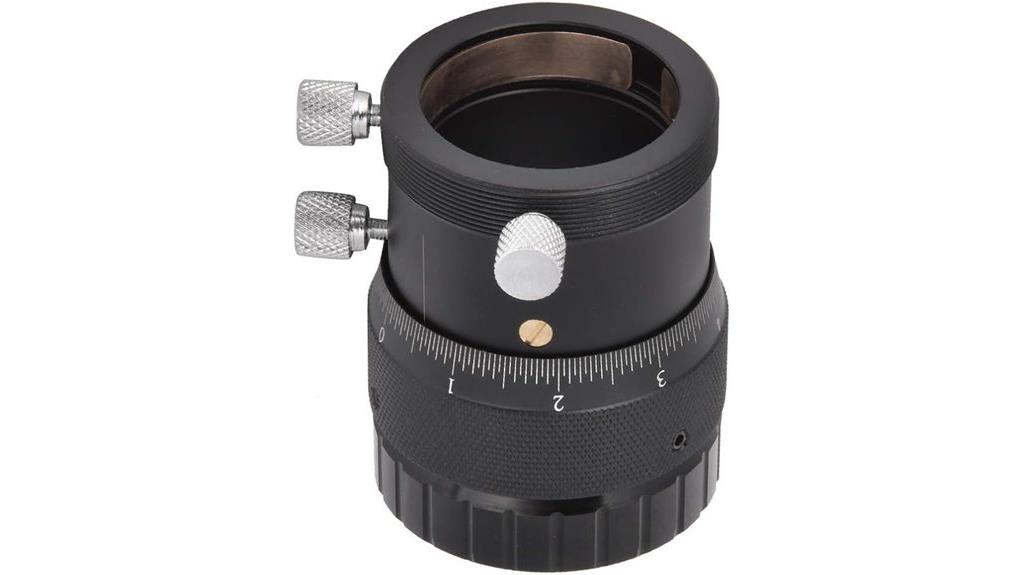
If you’re seeking a reliable and precise focuser for your astronomical telescope, the Aluminium Alloy 1.25-inch Inner T Interface helical focuser stands out as an excellent choice. Made from high-strength aluminium alloy, it’s durable and built to last, ensuring consistent performance during your observations. Its compact, lightweight design makes it easy to carry and handle. The high-precision double helical mechanism delivers smooth, sharp focusing, ideal for guider scopes, finder scopes, and telephoto lenses. Designed for seamless operation, it enhances your viewing experience by providing precise control and reducing focusing difficulties, making it a valuable addition to any telescope setup.
Best For: amateur astronomers, astrophotographers, and telescope enthusiasts seeking precise and durable focusing tools for their telescopic equipment.
Pros:
- Crafted from high-strength aluminium alloy for durability and long-lasting performance
- Compact, lightweight design enhances portability and ease of handling
- High-precision double helical mechanism ensures smooth, sharp focusing
Cons:
- May require additional adapters for some telescope models
- Limited to 1.25-inch inner T interface, not compatible with larger fittings
- Might be less suitable for professional-grade telescopes needing ultra-fine adjustments
Astromania AccuFocus Electronic Telescope Focuser
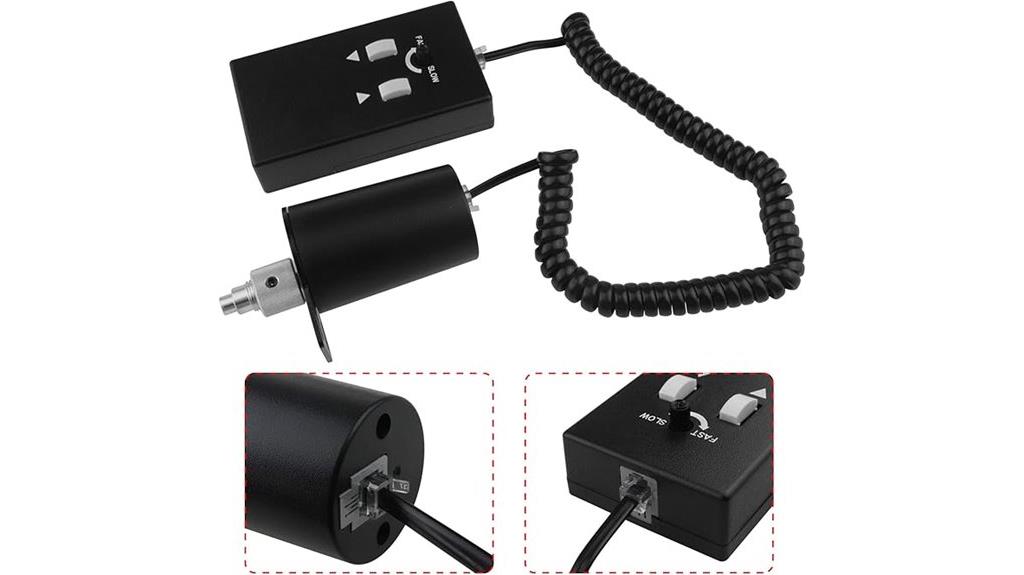
Achieving precise focus at high magnifications can be challenging, but the Astromania AccuFocus Electronic Telescope Focuser streamlines the process with its motorized design and pushbutton control. It offers smooth, accurate adjustments, reducing vibrations and image shake. Compatible with many Celestron, Skywatcher, Meade, and Orion telescopes, it’s ideal for single-speed refractors and reflectors between 60-127mm. The unit includes brackets, hardware, and a coil cable, though installation may require modifications like pipe clamps. Powered by a 9V battery, it provides adjustable speeds from coarse to fine focus. While generally helpful, some users report inconsistent motor performance and compatibility issues.
Best For: amateur astronomers seeking an affordable, motorized focuser to enhance high-magnification viewing on compatible refractor and reflector telescopes.
Pros:
- Provides smooth, precise, motorized focus adjustments reducing vibration and image shake
- Easy to operate via pushbutton control with adjustable speed settings from coarse to fine focus
- Compatible with many popular telescopes from Celestron, Skywatcher, Meade, and Orion
Cons:
- Some units experience inconsistent motor performance or intermittent operation
- Mounting brackets may require modifications or additional hardware for certain telescope models
- Reports of reversed directional controls and build quality variability can impact user experience
1.25 Inch Telescope Eyepiece Kit with Three Plossl Eyepieces

Looking for a versatile eyepiece kit that enhances your planetary and deep-sky observations? The 5 Inch Telescope Eyepiece Kit with Three Plossl Eyepieces is an excellent choice. It includes 6mm, 12.5mm, and 20mm fully coated lenses with a 52-degree field of view, compatible with 1.25-inch focusers and filters. The sturdy metal construction and blackened barrels reduce stray light, ensuring crisp, bright images. Its compact, lightweight design makes it easy to carry and store. Perfect for viewing the moon, planets, star clusters, and nebulas, this kit offers high-quality optics and user comfort, making it a valuable addition to any telescope setup.
Best For: Amateur astronomers seeking a versatile, high-quality eyepiece kit for detailed planetary, lunar, and deep-sky viewing with their 1.25-inch telescope.
Pros:
- Includes three fully coated Plossl eyepieces (6mm, 12.5mm, 20mm) for versatile magnification options
- Robust metal construction with internal blackening to reduce stray light and enhance contrast
- Compatible with 1.25-inch focusers and filters, suitable for a wide range of telescopes
Cons:
- Slightly heavier than smaller eyepieces, which may affect some lightweight telescope mounts
- Limited to 52-degree field of view, which may be narrower than wider-angle eyepieces
- Not specifically designed for astrophotography or ultra-high magnification imaging
1.25-Inch Helical Focuser for Telescope Lenses
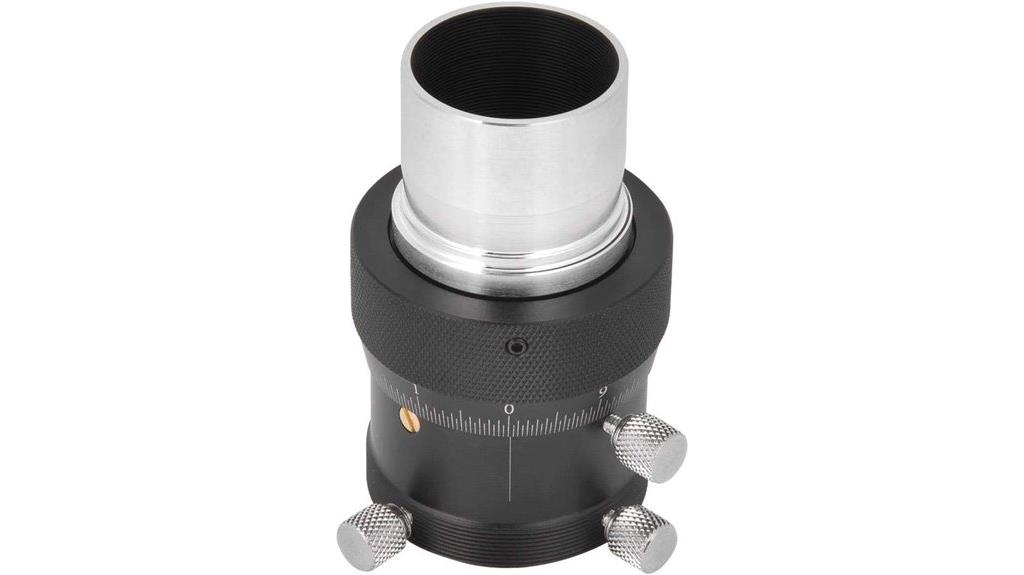
The 5-inch helical focuser for telescope lenses stands out as an ideal upgrade for amateur astronomers seeking precise, smooth focusing control. Made from durable aluminium alloy, it offers stability and a comfortable grip, weighing just 119 grams. With a 10mm focusing stroke and a high precision of 0.05mm, it’s perfect for fine-tuning astrophotography and detailed observations. Its compact, lightweight design allows easy installation and handling. Compatible with various accessories thanks to its M28.5*0.6 thread, it provides smooth adjustments that improve focus accuracy, making it a reliable, cost-effective upgrade for enhancing your telescope’s performance.
Best For: amateur astronomers and hobbyists seeking precise, smooth focus adjustments for astrophotography and detailed observations using telescope lenses and accessories.
Pros:
- High precision focusing with 0.05mm accuracy for sharp images
- Durable aluminium alloy construction ensuring stability and longevity
- Lightweight and compact design for easy installation and handling
Cons:
- Some units may have missing internal washers or O-rings affecting full travel
- Limited to a 10mm focusing stroke, which may be insufficient for very fine adjustments in some setups
- Compatibility depends on thread size; may require adapters for certain accessories
80mm Telescope Focusing Seat for Reflector Astronomical Telescopes
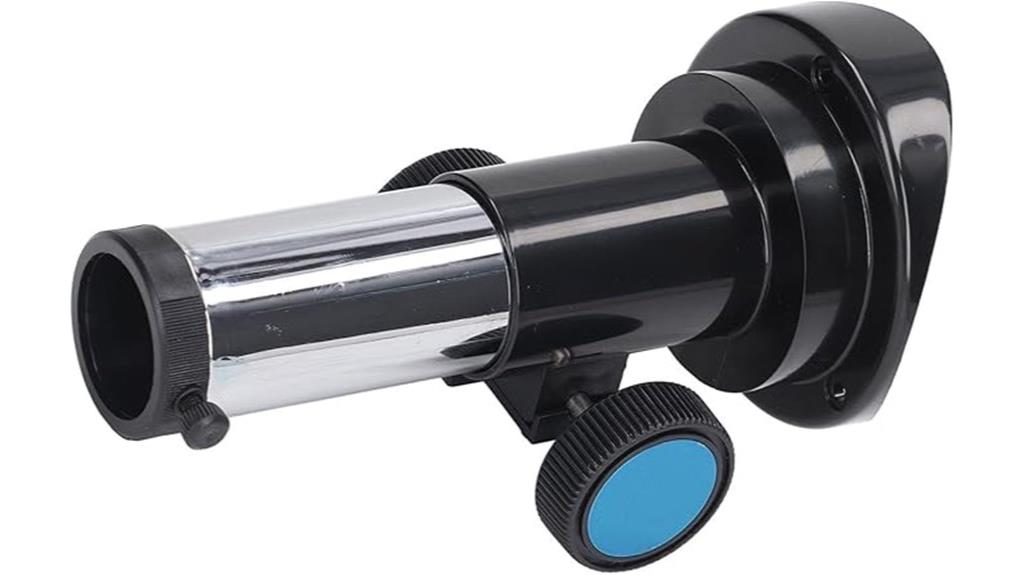
A 80mm telescope focusing seat with a 1.25-inch interface is an excellent choice for amateur astronomers who want precise manual control during their observations. This focusing seat is compatible with reflector telescopes up to 117mm in inner diameter and features a 67mm focal length for ultra-focusing accuracy. Made from durable ABS plastic, it’s lightweight yet sturdy, with internal threads that minimize reflections for clearer views. The bevel teeth and toothed extension gear ensure smooth, precise adjustments, while side screws securely hold eyepieces in place. Easy to install and operate, it’s perfect for enhancing high-magnification observing sessions.
Best For: amateur astronomers and DIY enthusiasts seeking precise manual focusing for reflector telescopes up to 117mm in diameter.
Pros:
- Easy to install and operate, suitable for DIY projects.
- Durable construction with high-quality ABS plastic for longevity.
- Provides smooth, precise adjustments with bevel teeth and toothed extension gear.
Cons:
- Some users note a plastic tact that may feel less premium.
- Limited to manual focusing; no motorized or automatic features.
- Compatibility limited to telescopes with an inner diameter up to 117mm.
Factors to Consider When Choosing a 1.25 Inch Telescope Focuser
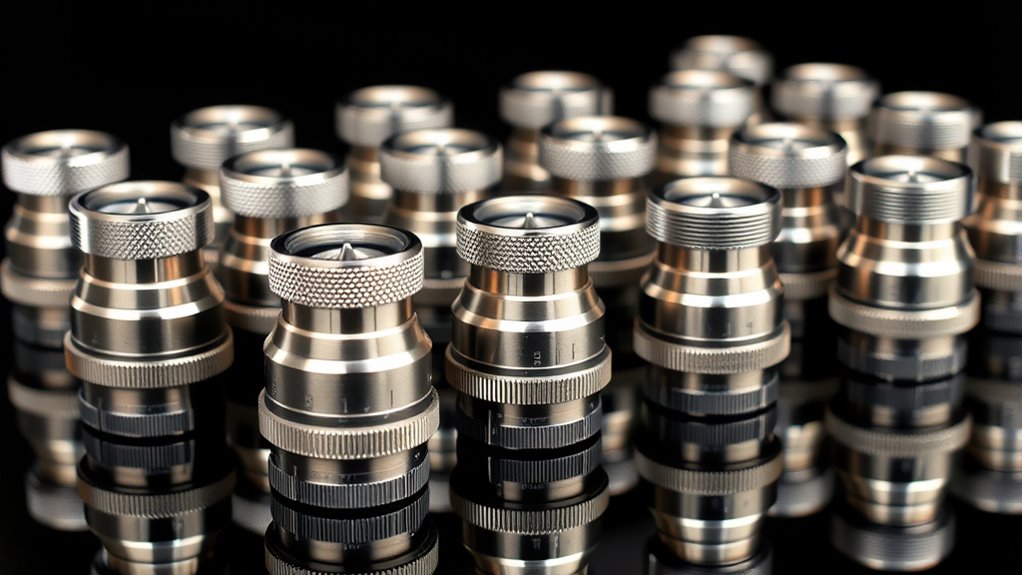
When selecting a 1.25-inch telescope focuser, I consider compatibility with my telescope type to guarantee a perfect fit. I also look at focusing mechanism precision and build quality because they impact ease of use and durability. Finally, I keep an eye on focusing range and installation simplicity to find a model that suits my observing needs.
Compatibility With Telescope Type
Choosing a 1.25-inch telescope focuser requires ensuring it’s compatible with your specific telescope type, since different designs have unique mounting and focusing mechanisms. For example, Newtonians, refractors, and Maksutov-Cassegrain telescopes each have distinct requirements. You need to verify that the focuser’s mounting thread, such as M42x0.75 or M31x0.5, matches your telescope’s threaded connection. Additionally, check if the internal diameter and mounting interface support your telescope’s dimensions and threading standards. Mechanical design is also important; some focusers suit rack and pinion systems, while others work better with helical mechanisms. Ensuring compatibility with your telescope’s focusing style helps achieve smooth operation and secure attachment for precise viewing.
Focusing Mechanism Precision
The precision of a focusing mechanism plays a critical role in achieving sharp, clear images, especially at high magnifications or during astrophotography. High-quality focusers can achieve adjustments as fine as 0.05mm, making precision essential for detailed observing. Double helical and rack and pinion systems generally offer smoother, more accurate control than simpler friction or helical designs. The number of turns per inch (TPI) directly affects how delicately you can focus; higher TPI allows for finer adjustments. Internal features like threaded components, O-rings, and washers contribute to consistency and repeatability in focusing. A well-engineered focuser minimizes backlash and play, ensuring stable focus during critical observations. Precision focusing ultimately enhances image sharpness and detail, making it a fundamental factor in choosing your telescope focuser.
Material Durability and Build
Material durability is a crucial factor in selecting a 1.25-inch telescope focuser, as it directly impacts the device’s longevity and performance. Focusers made from full metal constructions, especially those using brass or steel for internal threading and moving parts, tend to be more robust and resistant to wear. Aluminum alloy is a popular choice because it offers a lightweight yet sturdy build, reducing added weight without sacrificing strength. Poor-quality materials or manufacturing can lead to parts breaking or degrading over time, especially under heavy use or harsh conditions, compromising stability. A well-built focuser using high-quality materials resists corrosion, environmental damage, and mechanical stress, ensuring reliable, precise focus control throughout its lifespan. Durability ultimately safeguards your investment and maintains excellent performance over the years.
Focusing Range and Stroke
When selecting a 1.25-inch telescope focuser, it’s essential to contemplate its focusing range and stroke, as these determine how much the eyepiece or camera can be moved for sharp focus. The focusing stroke, usually between 10mm and 38mm, indicates how far you can adjust the focus. A longer stroke offers more flexibility, especially useful when using heavy or multi-element accessories that require precise tuning. The focusing range defines how much you can shift the focal plane without additional parts like extension tubes. A limited stroke might restrict focusing at high magnifications or with filters, making adjustments difficult. Choosing a focuser with an appropriate focusing range ensures compatibility with your setup and helps you maintain ideal image sharpness during your observations.
Ease of Installation
Choosing a 1.25-inch telescope focuser that’s easy to install can save you time and frustration during setup. I look for models with clear, detailed instructions tailored to my telescope’s mounting system, making installation straightforward. Compatibility is key—ensuring the focuser has matching threads and adapters helps avoid extra modifications. I prefer models with user-friendly locking screws and tension adjustments, which keep everything secure and smooth during installation. A well-designed focuser that allows for easy alignment and balancing reduces the need for complex tools or adjustments. Additionally, I check that the build quality and mounting hardware are robust enough to support my accessories, simplifying installation and minimizing the risk of damage. Overall, ease of installation ensures a hassle-free setup and reliable operation.
Price and Value
Price and value are essential considerations because a more expensive focuser isn’t always the best choice, but opting for a budget model can lead to frustrations and limited performance. Focusers range from around $20 for basic models to over $100 for premium units, impacting overall worth. Higher-priced focusers usually offer better build quality, smoother operation, and greater precision, making them worth the investment for serious astronomers. Cheaper options might seem appealing but often come with increased play, fragility, or less accurate focusing—factors that can compromise your viewing experience and durability. When choosing, consider features like focusing accuracy, load capacity, and upgrade potential relative to cost. A moderately priced, well-reviewed focuser strikes a balance, delivering reliable quality without overspending.
Frequently Asked Questions
How Do I Install a 1.25-Inch Focuser on My Telescope?
To install a 1.25-inch focuser, I start by removing the existing focuser if there is one. Then, I carefully align the new focuser with the telescope’s threaded or mounting hole. I tighten the screws securely to prevent slippage, making sure the focuser moves smoothly. Finally, I attach the telescope accessories, like eyepieces, and test the focus to guarantee everything is aligned properly.
What Maintenance Is Required for a Helical Focuser?
When it comes to maintaining a helical focuser, I keep things simple. I regularly clean the threads with a soft brush or cloth to prevent dust buildup, and I apply a tiny amount of lubricant designed for precision parts every few months. This keeps the focus smooth and avoids jamming. Plus, I always check for any loose screws to guarantee everything stays secure during those critical observing moments.
Can These Focusers Be Used With DSLR Cameras?
Yes, these focusers can be used with DSLR cameras. I’ve found that most 1.25-inch focusers are compatible with standard T-ring adapters, making attaching my DSLR straightforward. Just make certain you select a focuser with enough load capacity and smooth movement for precise focusing. I recommend checking the specifications to confirm compatibility, but in my experience, they work seamlessly for astrophotography and detailed viewing.
Are There Any Compatibility Issues With Different Telescope Brands?
Think of telescope focusers like universal adapters—they often fit many brands, but some may have quirks. I haven’t encountered major compatibility issues, but it’s wise to check your telescope’s mounting system and the focuser’s specifications. Some models are more versatile, fitting a range of brands, while others might require adapters. Always double-check before buying to guarantee a smooth connection and peak performance.
How Do I Adjust for Smooth Focusing During Observations?
To adjust for smooth focusing, I start by gently turning the focus knob, avoiding sudden movements that could jar the image. I fine-tune gradually, feeling for resistance and stopping at the clearest view. If the focus feels stiff, I check for any debris or misalignment, and sometimes I apply a tiny bit of lubricant to keep it moving smoothly. Consistent, gentle adjustments make for sharp, stable images.
Conclusion
Choosing the right 1.25-inch focuser really makes a difference in your viewing experience. With so many great options out there, it’s all about finding what fits your telescope and needs best. Remember, a chain is only as strong as its weakest link—invest in quality to enjoy clear, precise views. Ultimately, the right focuser helps turn your stargazing into a truly stellar adventure. Happy observing!
